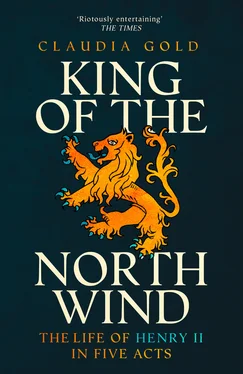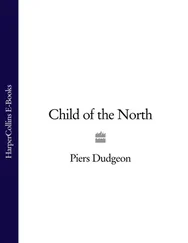What of ‘queenship’, or a woman’s right to rule independently of a father or son? Women were encouraged to pursue the traditional queenly roles of intercessors, helpmates, and even occasionally regents. But there were hardly any examples in the twelfth century of women ruling alone, and King Henry would have been aware of how unusual it was to nominate a woman as his successor.
Although in France, Salic law – where women were barred from the throne – was a development of the fourteenth century (when the death of all of Philip le Bel’s male heirs by 1328 precipitated a succession crisis), there was no tradition of female rule in France; the French were, at best, ambivalent about women rulers.28 England developed no such law, but there was very little precedent for female rule. Many European noblewomen such as Matilda participated in government, although of Matilda’s contemporaries, only two ruled as queens in their own right – Urraca, daughter of Alfonso VI of Castile and León, and Melisende, daughter of Baldwin II of Jerusalem. Both found it impossible to rule alone for long. Urraca, after her father’s death, swiftly married Alfonso of Aragon, ‘the battler’, to shore up her regime. Melisende was married off to Count Fulk V of Anjou and never reigned entirely alone, obliged to associate herself first with her father, and then her husband.
With Matilda safely back in England, the king pondered. It was still plausible that his young wife would become pregnant and he kept her constantly at his side. The other possible contenders were his sister Adela’s sons, Theobald and Stephen; and his illegitimate son Robert of Gloucester, a man of great intelligence, capability and wealth.
Henry I liked to surround himself with the scions of the Anglo-Norman nobility, partly as companions for William Atheling before his death. At court, Matilda encountered her half-brothers and the king’s eldest bastard sons, Robert and Richard, as well as her uncle, David of Scotland. She also met her cousin, Stephen.
Stephen was born in about 1092, the third son of Adela and Étienne VI count of Blois-Chartres. Étienne was a controversial figure. He had answered the pope’s call to the first crusade enthusiastically in 1096 but had not, according to contemporaries, behaved well; he failed to bring his men to aid the Christian forces as they besieged Antioch. Perhaps to assuage his conscience, he returned to Jerusalem in 1101, where he was killed the following year, at the battle of Ramlah. Stephen’s father was absent during his childhood, and after his death it was Stephen’s uncle, now king of England and duke of Normandy, who showed him kindness and favour when he welcomed him at court.
Stephen was charming and liked to please people; he swiftly became a favourite of Henry I. In 1113, when Stephen was about twenty-one years old, Henry gave him lands and created him count of Mortain at his Christmas court.
After William Atheling died, the old king showered honours on his other close male relations, creating powerful and wealthy lords out of those he trusted and loved. By 1125, with Adeliza still not pregnant and with Matilda still married and in Germany, Henry may have briefly considered Stephen to succeed him; he loved him, and respected his skills as a politician and a soldier. Stephen was a very likeable man: ‘he had by his good nature and the way he jested, sat and ate in the company even of the humblest, earned an affection that can hardly be imagined’.29 To strengthen Stephen’s hand against William Clito, who had a better claim, the king married him to the heiress Matilda of Boulogne, which made him rich and gave him lands. Stephen was a moral man; his marriage arranged, he left the woman who had been his mistress for at least ten years – Damette (Little Lady) – by whom he had a son, Gervase, and possibly a daughter.30 He did provide financially for Damette and his illegitimate son: in the 1130s, she was able to put a large sum towards the lease of the manor at Chelsea, and, in 1138, he arranged for Gervase to become abbot of Westminster Abbey. But his relationship with Damette was over. Stephen’s marriage to Matilda of Boulogne, although not a love match, would prove an extraordinary partnership.
With his daughter Matilda back in England, Henry I evidently changed his mind about Stephen succeeding him; blood triumphed over gender.
Two years after Matilda’s return, her father finally committed to naming her as his successor. What Matilda’s feelings were, we do not know. We do know, however, that while in Germany, she had aided Heinrich in government, acting with enthusiasm and diligence. She had not been a lazy consort. She evidently had a talent for diplomacy; later, she would apply the lessons learned with Heinrich and at the papal court to aid her own cause. It is likely that her experiences in Germany had given her a taste for power and that she was happy to comply with her father’s plans.
At the end of his Christmas court on 1 January 1127, Henry strong-armed his magnates into accepting her as their future monarch.31 The nobility of England and Normandy, with Matilda supported by her uncle, David King of Scots, lined up before the empress and swore to uphold her right to the throne of England on her father’s death:
[Henry] bound the nobles of all England, likewise the bishops and abbots, by oath, that if he died without a male heir they would immediately accept his daughter as their lady ( domina ). He said first what a disaster it had been that William, to whom the realm belonged, had been taken away; now there remained only his daughter, to whom alone the succession rightfully belonged because her grandfather, uncle and father had been kings and on her mother’s side she was descended from fourteen kings from the time of Egbert. Edward, the last of the race, had arranged the marriage of Malcolm and Margaret, and Matilda, mother of the empress, was their daughter.32
Stephen, whatever his personal feelings on the momentous change to his prospects, was the first to promise to be faithful to Matilda as Henry I’s chosen successor, even fighting with his cousin Robert of Gloucester for the honour of being first. But Stephen never forgot his uncle’s fleeting desire to make him king.
Henry I knew that his plan was precarious, and it may well have included his daughter getting pregnant and producing a son who would eventually rule England and Normandy in her place. Perhaps Hermann of Tournai’s account of Matilda giving birth to a dead child in Germany was true; the king evidently trusted in her fertility and now he found a husband for her.
His choice was Geoffrey of Anjou, eldest son of Count Fulk V and brother of William Atheling’s widow. Geoffrey was not Matilda’s only suitor. William of Malmesbury wrote in the Historia Novella that ‘some princes of Lotharingia and Lombardy came to England more than once … to ask for her as their lady, but gained nothing from their efforts, the king being minded to establish peace between himself and the Count of Anjou by his daughter’s marriage’.33
Matilda may have agreed with her father’s plans to make her queen, but she was dismayed at his choice of husband for her, and protested. She had been married to an emperor and was now asked to marry a mere nobleman. She may also have been horrified by the age gap. When marriage negotiations began in the spring of 1127, Matilda was twenty-five and Geoffrey fourteen. Her father’s friend Hildebert of Lavardin, possibly at the king’s request, wrote to her to ‘beg her to set his mind at rest about a report brought to him from England that she was causing distress to her father through her disobedience’.34
But despite her age and status as widowed empress, Matilda had no voice in the choosing of her second husband, and she complied. As the chronicler noted, Henry needed to cement relations with Anjou, which bordered Normandy to the south. Her brother William Atheling’s death just weeks after his marriage to Geoffrey’s sister, also named Matilda, undermined the alliance between Anjou and Normandy that this union had created. Henry had battled Fulk intermittently throughout the 1110s and 1120s for control of Maine. In 1118, a chronicler wrote how:
Читать дальше












